Assignment 1 CTF - CS2107 Information Security
By: Yukna on ( Updated: )
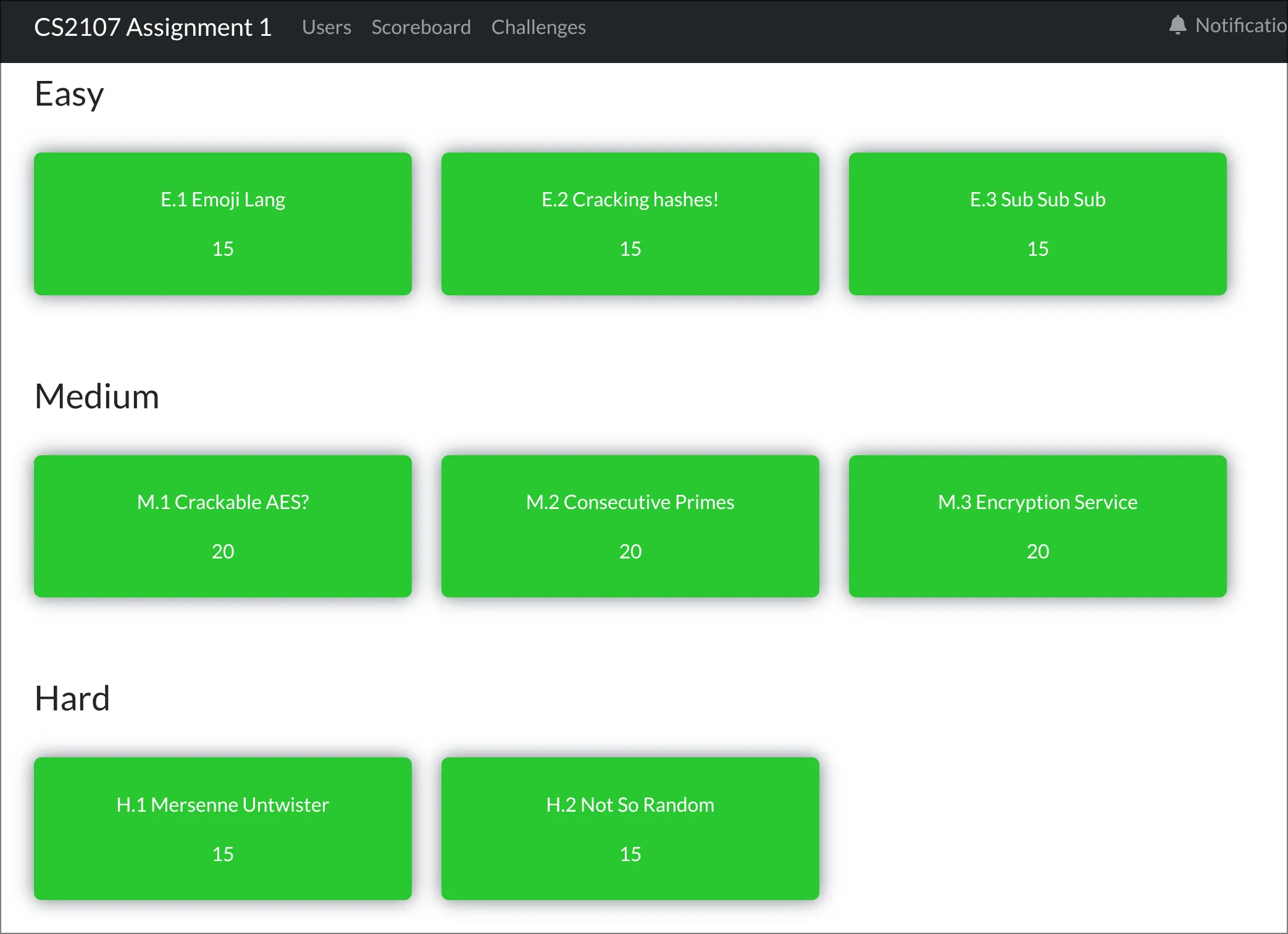
What is this?
Recently I completed and received the results of my 1st CTF of National University of Singapore (NUS) CS2107 Information Security course. This assignment particularly focuses on the security aspects of crypto and ciphers, particularly how every bolt of this mechanism plays a part and cutting one might completely render the whole entire security obsolete.
Honestly, it was very fun! I think this has taught me more on how we cannot blindly trust encryption just because it is industry standards - we need to use them properly. It reminds me of those tiktok/vine videos of people bolting their door shut with a slide bolt, only for the door to slide open instead of being unable to swing open.
I actually was addicted to this and neglected to complete my other assignments… :sad:
Preface
All assignments were done using an ephemeral nix-shell with the following config (Note - this is not recommended when doing CTFs because accidentally running any programme or script is a great way to have a bad day):
{ pkgs ? import <nixpkgs> {} }:
pkgs.mkShell {
buildInputs = with pkgs; [
gcc
hexdump
file
(python3.withPackages (ps: with ps; with python3Packages; [
bpython
pwntools
pycryptodome
python-dotenv
# randcrack
(
buildPythonPackage rec {
pname = "randcrack";
version = "0.2.0";
src = fetchPypi {
inherit pname version;
sha256 = "sha256-zM9OzeoUdmZTDwgm0Rpyv8lnzNerNuLt+alR3nwHAhs=";
};
doCheck = false;
}
)
]))
];
}The python version is as followed: Python 3.12.8
The gcc version is as followed:
╰─❯ gcc -v
Using built-in specs.
Target: x86_64-unknown-linux-gnu
Thread model: posix
Supported LTO compression algorithms: zlib
gcc version 14.2.1 20241116 (GCC) Easy Challenges
E.1 Emoji Lang
Prompt:
Author: Jonathan Loh
Happy birthday! Here's a message written using our favorite emoji lang! As
usual, each emoji maps
to a letter!
😘😀🤢🤢😍 🤩😋😵😂😘😬😀😍!! 😘😊🤢😉 😍😊😭😵 😬😀😍’😱 🤫😭🤬🤬 😊🤫 😁😊
😊😬 🤮😋🤩😉😱, 😁😊😊😬 🤫😊😊😬, 😀😇😬 😀🤬🤬 😂😘😉 😂😘😋😇😁😱 😍😊
😭 🤬😊🤮😉. 😍😊😭 😬😉😱😉😵🤮😉 😂😘😉 🤩😉😱😂, 😱😊 🥰😀🥶😉 😱😭😵😉
😂😊 😂😵😉😀😂 😍😊😭😵😱😉🤬🤫 (😀😇😬 😉😀😂 😉🥳😂😵😀 🥵😀🥶😉 🤫😊😵
🥰😉 🤬😊🤬). 😀🤬😱😊, 😘😉😵😉’😱 😂😊 🥵😉🤬😉🤩😵😀😂😋😇😁 😂😘😉 😱😉
🥵😵😉😂 🤬😀😇😁😭😀😁😉 🧐😉 😭😱😉 😂😊 😂😀🤬🥶 😂😊 😉😀🥵😘 😊😂😘😉
😵 😉🤮😉😵😍 😬😀😍. 😋😂 🥰😀🥶😉😱 😉🤮😉😵😍😂😘😋😇😁 😱😊 🥰😭🥵😘 🥰
😊😵😉 🤫😭😇 😀😇😬 🤫😉😉🤬😱 🤬😋🥶😉 😊😭😵😊🧐😇 🤬😋😂😂🤬😉 🥵😊😬😉
. 🥵😘😉😉😵😱 😂😊 😀😇😊😂😘😉😵 😍😉😀😵 😊🤫 🤬😀😭😁😘😱, 😀😬🤮😉😇😂
😭😵😉😱, 😀😇😬 😵😀😇😬😊🥰 😱😘😉😇😀 😇😋😁😀😇😱. 🤬😉😂’😱 🥵😉🤬😉🤩
😵😀😂😉 😱😊😊😇!
🥵😱🤨🤯🤪🤑{😱🥶😋🤩😋😬😋_😉🥰😊😮😋_🤬😀😇😁😭😀😁😉_😁😊_🤩😵😵😵😵😵😵}This is a 1-to-1 substitution cipher. I was initially inclined to analyse the frequency of the emoji cipher and map them to the known frequency distribution of English, but if the message is written with liberty then it might not provide the correct frequency.
However, I noticed two things:
- There were two-letter and three-letter words which could only belong to a finite number of English words
- The message is definitely Birthday themed.
Therefore I first saw a string that matched the character distribution of Happy Birthday I put them in a Dict[str,str] in python where the key (emoji) maps to the value of the corresponding message. There were duplicate keys, which corresponds to the duplicate p, a, h and y in happy birthday.
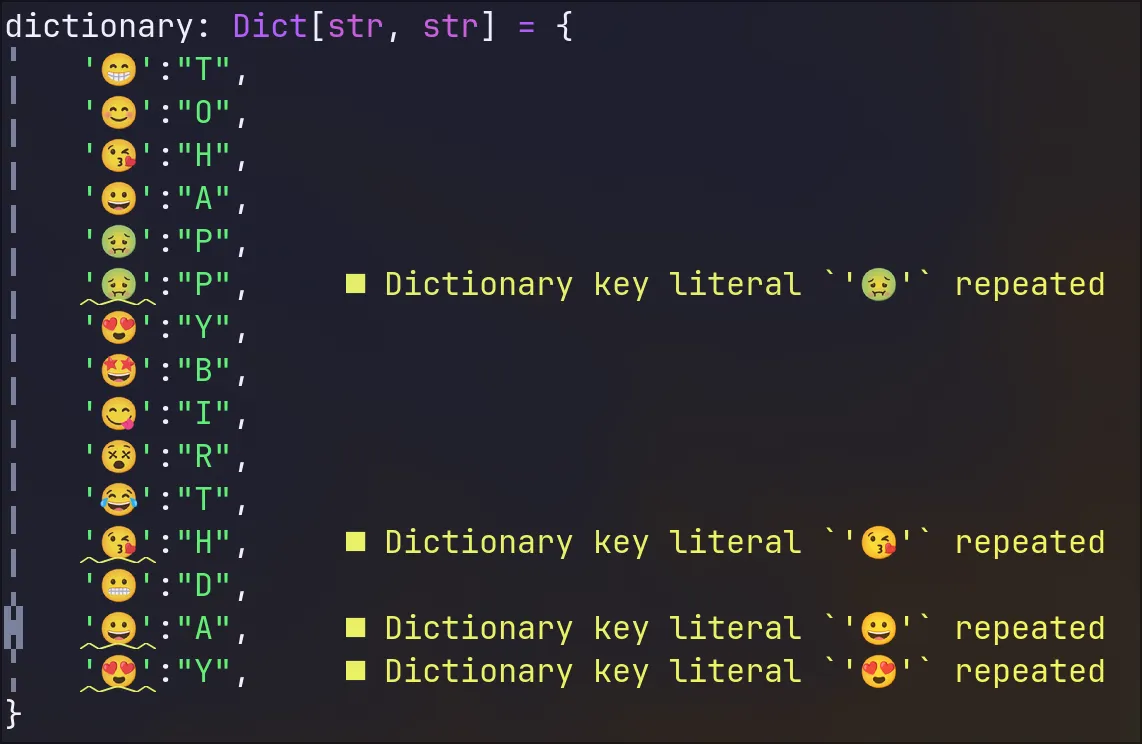
I then loop through each character and if there exist a key-pair value, I append the associated charater into a new result string. Else append the cipher character itself.
message = ""
for c in cipher:
if c in dictionary:
message += dictionary[c]
else:
message += c
print(message)At the first iteration, there is still a lot needed to be deciphered.

It however gave much clues, and I continued to decipher the emojis that replaced obvious characters in certain words. For example:

This continued for serveral iterations. However, other than looking at the undeciphered characters, I was also looking at whether the deciphered ones were correct. I realised some mistakes I did. I did not recognise any words ending with UAA or AAA:

I realised that the AAA mapped to 😀🤬🤬, meaning I accidentally mapped two emojis to the same character A. I guessed this was supposed to be ALL, so I went to check and sure enough it was keyed in wrongly.

I changed it to L and try again. I noticed another issue, where the G became T leading to THINT.

I fix that and was left with 5 more characters:

The last charater is J in EMOJI, which interestingly did not appear anywhere else. The first four, had to be 2107 since it would yield the format of the key as described in the instructions.

The deciphered message:
HAPPY BIRTHDAY!! HOPE YOUR DAY’S FULL OF GOOD VIBES, GOOD FOOD, AND ALL THE
THINGS YOU LOVE. YOU DESERVE THE BEST, SO MAKE SURE TO TREAT YOURSELF (AND
EAT EXTRA CAKE FOR ME LOL). ALSO, HERE’S TO CELEBRATING THE SECRET LANGUAGE
WE USE TO TALK TO EACH OTHER EVERY DAY. IT MAKES EVERYTHING SO MUCH MORE
FUN AND FEELS LIKE OUR OWN LITTLE CODE. CHEERS TO ANOTHER YEAR OF LAUGHS,
ADVENTURES, AND RANDOM SHENA NIGANS. LET’S CELEBRATE SOON!
CS2107{SKIBIDI_EMOJI_LANGUAGE_GO_BRRRRRR}Key: CS2107{SKIBIDI_EMOJI_LANGUAGE_GO_BRRRRRR}
E.2 Cracking hashes!
prompt:
Author: Lee Kai Xuan
Yo, try cracking this hash: e82d0df0e1001e2c33bc12900faf06e5
But watch out for those rocks! They may just rock you! Wrap the string in
"CS2107{FLAG}". For example, if e82d0df0e1001e2c33bc12900faf06e5 is the
hash of the word "ilovecs", the flag is CS2107{ilovecs}
Unlock Hint for 0 points
Try some hash cracking tools! There's something about "hash of a cat", or even
a guy named "John" hmm...
Unlock Hint for 0 points
Once you have the tool, you just need a wordlist! There's something about this
hash that will "rock you" hmm...
My gosh. Looking at the hints, it is definitely using JohnTheReaper to crack, using the infamous rockyou.txt list.
That being said, I am lazy so I just opened up CyberChef and pasted the link into the Input. I use the Anaylse Hash recipe and get the output:
Hash length: 32
Byte length: 16
Bit length: 128
Based on the length, this hash could have been generated by one of the
following hashing functions:
MD5
MD4
MD2
HAVAL-128
RIPEMD-128
Snefru
Tiger-128I will hazard a guess and say it is MD2 / MD4 / MD5. Since the clue is Rockyou.txt, most online free-to-use reverse MD5 dehashers will be able to use the rainbow table to reverse lookup. I choose md5decrypt.net. Here is the output:
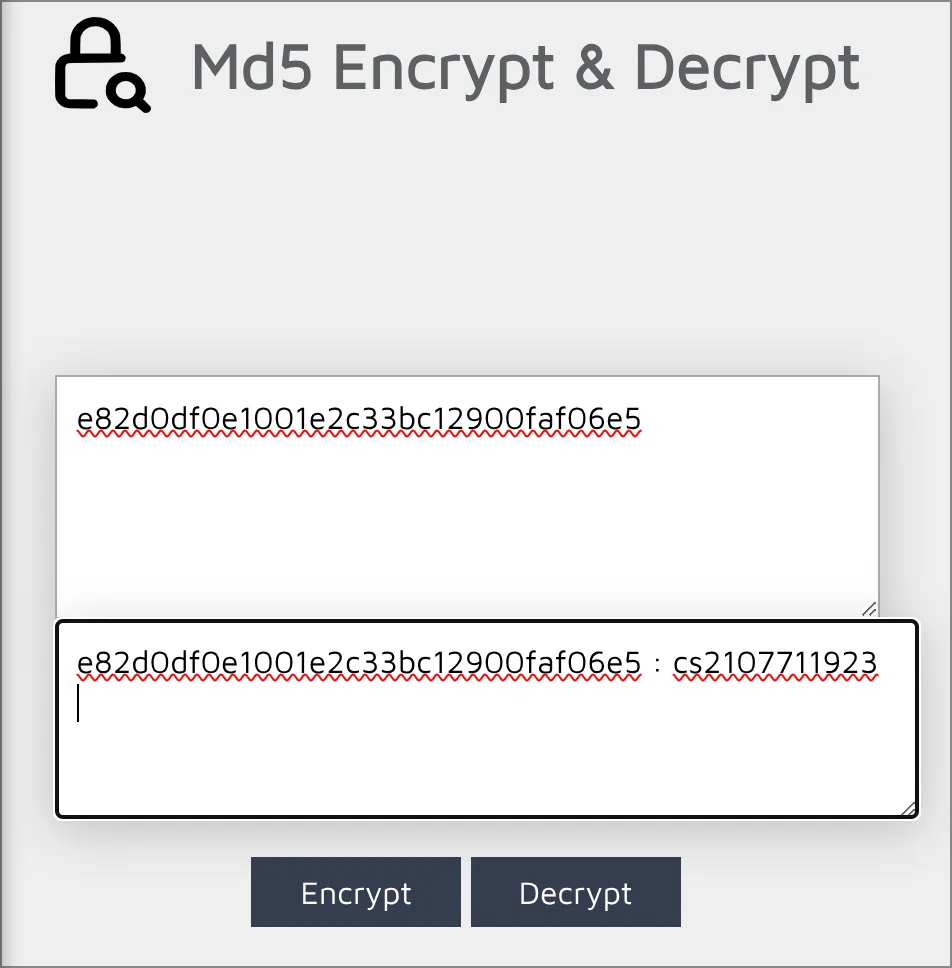
Key: CS2107{cs2107711923}
E.3 Sub Sub Sub
Prompt:
Author: River Koh
Is this what they call layered security? Here's a bunch of substition ciphers,
even if you know the key, it would take you really long to trace and
decrypt the flag!Attachments:
Encryption_Scheme.pdf
Looking at the pdf shows this:
A B C D E F G H I J K L M N O P Q R S T U V W X Y Z
↓ ↓ ↓ ↓ ↓ ↓ ↓ ↓ ↓ ↓ ↓ ↓ ↓ ↓ ↓ ↓ ↓ ↓ ↓ ↓ ↓ ↓ ↓ ↓ ↓ ↓
Q O G R M K P I B N E V D W Y L X C U F J H A S T Z
↓ ↓ ↓ ↓ ↓ ↓ ↓ ↓ ↓ ↓ ↓ ↓ ↓ ↓ ↓ ↓ ↓ ↓ ↓ ↓ ↓ ↓ ↓ ↓ ↓ ↓
C S A Z R X P J G Q N B O F M V E T H D L K Y W U I
↓ ↓ ↓ ↓ ↓ ↓ ↓ ↓ ↓ ↓ ↓ ↓ ↓ ↓ ↓ ↓ ↓ ↓ ↓ ↓ ↓ ↓ ↓ ↓ ↓ ↓
F S P O I B Q H Z A X E D K Y M W J U V N R T G C L
↓ ↓ ↓ ↓ ↓ ↓ ↓ ↓ ↓ ↓ ↓ ↓ ↓ ↓ ↓ ↓ ↓ ↓ ↓ ↓ ↓ ↓ ↓ ↓ ↓ ↓
O P D V N Z M J Y E C S K Q H F I T U W B L X A R G
↓ ↓ ↓ ↓ ↓ ↓ ↓ ↓ ↓ ↓ ↓ ↓ ↓ ↓ ↓ ↓ ↓ ↓ ↓ ↓ ↓ ↓ ↓ ↓ ↓ ↓
U B G Z A Y T D M Q O P J H V E W C I K R S F X L N
↓ ↓ ↓ ↓ ↓ ↓ ↓ ↓ ↓ ↓ ↓ ↓ ↓ ↓ ↓ ↓ ↓ ↓ ↓ ↓ ↓ ↓ ↓ ↓ ↓ ↓
O Y I V S L C R U G M E D T A Z K J W F X H N Q P B
↓ ↓ ↓ ↓ ↓ ↓ ↓ ↓ ↓ ↓ ↓ ↓ ↓ ↓ ↓ ↓ ↓ ↓ ↓ ↓ ↓ ↓ ↓ ↓ ↓ ↓
B X L C E R F Y U J O N P W I A Q T V D S G Z M K H
↓ ↓ ↓ ↓ ↓ ↓ ↓ ↓ ↓ ↓ ↓ ↓ ↓ ↓ ↓ ↓ ↓ ↓ ↓ ↓ ↓ ↓ ↓ ↓ ↓ ↓
D R B P A T V O G I H Y W U N M X C L Z K Q J F S E
↓ ↓ ↓ ↓ ↓ ↓ ↓ ↓ ↓ ↓ ↓ ↓ ↓ ↓ ↓ ↓ ↓ ↓ ↓ ↓ ↓ ↓ ↓ ↓ ↓ ↓
Z N W S F L J D C B K Q R T V U Y O E H M A I X P G
↓ ↓ ↓ ↓ ↓ ↓ ↓ ↓ ↓ ↓ ↓ ↓ ↓ ↓ ↓ ↓ ↓ ↓ ↓ ↓ ↓ ↓ ↓ ↓ ↓ ↓
U Q L M J W Z F B E C Y I K P D R V A S O H T N G X
↓ ↓ ↓ ↓ ↓ ↓ ↓ ↓ ↓ ↓ ↓ ↓ ↓ ↓ ↓ ↓ ↓ ↓ ↓ ↓ ↓ ↓ ↓ ↓ ↓ ↓
M E P N Q G Z S Y F I J U O X L W H A R D B V K T C
↓ ↓ ↓ ↓ ↓ ↓ ↓ ↓ ↓ ↓ ↓ ↓ ↓ ↓ ↓ ↓ ↓ ↓ ↓ ↓ ↓ ↓ ↓ ↓ ↓ ↓
U D K N O E V R J X B F W S P L A M G T Z Q I H C Y
↓ ↓ ↓ ↓ ↓ ↓ ↓ ↓ ↓ ↓ ↓ ↓ ↓ ↓ ↓ ↓ ↓ ↓ ↓ ↓ ↓ ↓ ↓ ↓ ↓ ↓
P W L E Y A B G V N M X S D Z K H R J U I C Q O T F
↓ ↓ ↓ ↓ ↓ ↓ ↓ ↓ ↓ ↓ ↓ ↓ ↓ ↓ ↓ ↓ ↓ ↓ ↓ ↓ ↓ ↓ ↓ ↓ ↓ ↓
Z F O K P C Y A N X D R M H L G V T J S U E B W Q I
↓ ↓ ↓ ↓ ↓ ↓ ↓ ↓ ↓ ↓ ↓ ↓ ↓ ↓ ↓ ↓ ↓ ↓ ↓ ↓ ↓ ↓ ↓ ↓ ↓ ↓
P K D F U B L I S Z H N X T A Y G J Q O M C V R E W
DQ2107{KUO_OISQ_OAAH_EAM_P_VISNU}I can tell from the 2107 in the last line that it is the encrypted flag. Immediately, I can tell that C mapped to D and Smapped to Q. If we compared the first and last line of the substition cipher given, we get:
A B C D E F G H I J K L M N O P Q R S T U V W X Y Z
P K D F U B L I S Z H N X T A Y G J Q O M C V R E W
DQ2107{KUO_OISQ_OAAH_EAM_P_VISNU}Sure enough, C mapped to D and Smapped to Q. No matter how many layers of substitution, the composition of every substition function map yields a single substition map.
I open up CyberChef and used the substite recipe, giving the plaintext and ciphertext strings:
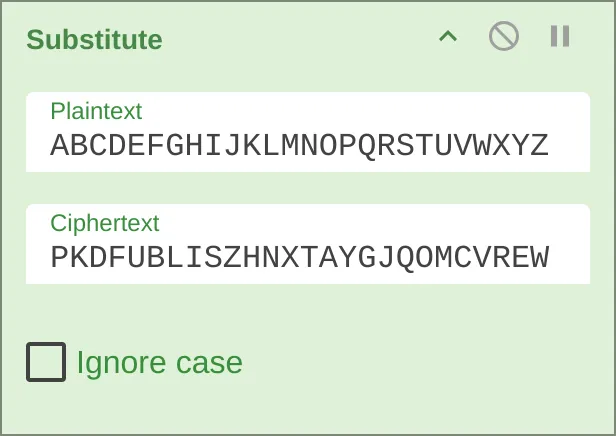
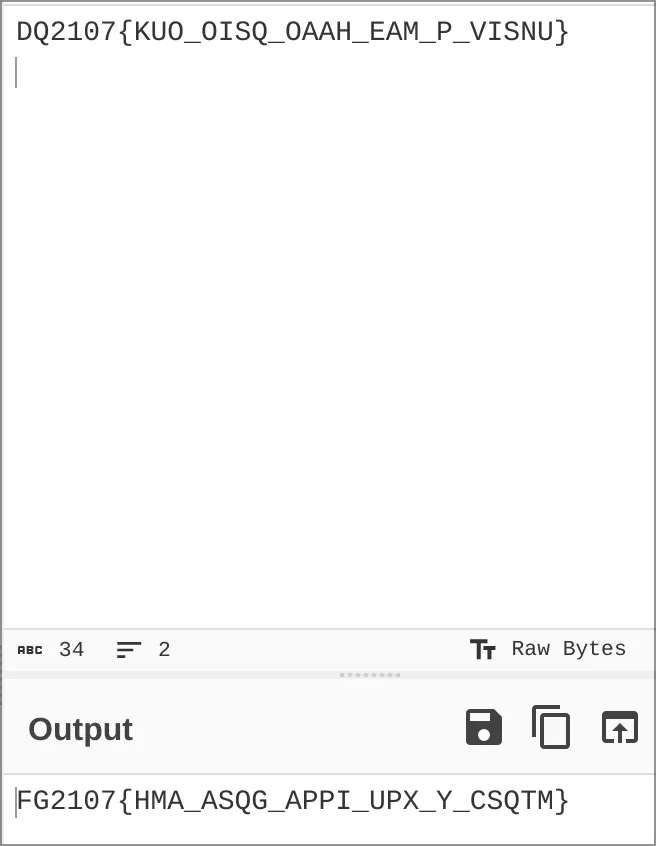
Oops. The output is FG2107{HMA_ASQG_APPI_UPX_Y_CSQTM} which is clearly wrong. I forgot to reverse the plaintext and ciphertext key!
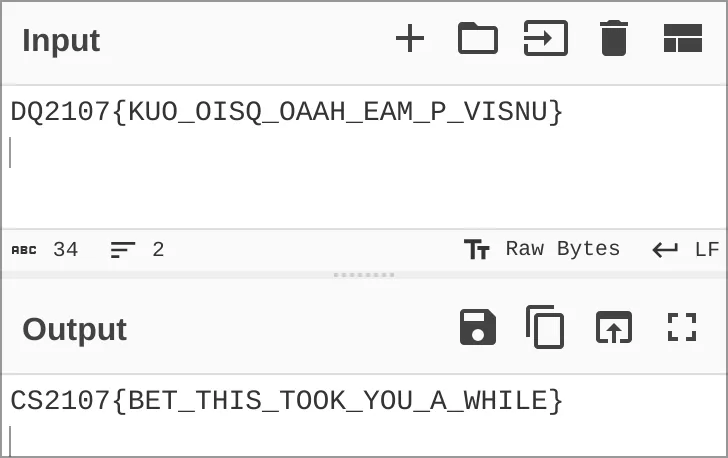
Key: CS2107{BET_THIS_TOOK_YOU_A_WHILE}
Medium
M.1 Crackable AES?
Prompt:
Author: Cao Yitian
I was told this is crackable! But it is encrypted in AES... isn't that uncrackable?
Oh, and I was also told to "watch out for the red herring", whatever that means...
Unlock Hint for 0 points
Is there another way to attack this encryption?
Attachments:
outputherring.py
herring.py contains:
# Flag is the secret and will be in the format CS2107{50m3th1ng}
# 3 things to import
from Crypto.Cipher import AES
from random import randbytes
from Crypto.Util.Padding import pad
# Randomly generated key!
cipher = AES.new(randbytes(16),AES.MODE_ECB)
secret = "[REDACTED]"
code = open("herring.py","rb").read()
with open("output","wb") as f:
for i in code:
f.write(cipher.encrypt(pad(bytes([i]),16)))
while output is a data file according to file.
Things I noted:
- AES using electronic codebook mode encryption (ECB)
- Block size of 16 bytes and each character is padded to 16 bytes
outputis the encryption ofherring.pybut probably without thesecretdecrypted.
ECB is vulnerable because cipher blocks are identical if plaintext is.
I first do a sanity check to confirm that each character is taken as 8-bit byte and then padded to 16 bytes (128 bits):
╰─❯ wc -c output
7312 output
╰─❯ wc -c empty.py
407 empty.pyThe encrypted file size of 4352 is 16 times larger than the original file. This correctly indicates that each 1-byte character of the source python file is encrypted into 16 bytes of encrypted blocks. This helps us guess the length of the secret key.
╰─❯ wc -c output
7312 output
╰─❯ wc -c empty.py
407 empty.pyThe original encrypted file is 7312 bytes, which means the original file is 457 bytes. That gives us a secret key file size of 50 Bytes (including the CS2107{} prefix). The file can be broken down into:
bytes
+-----+
| |
| |
| 265 | Head of code
| |
| |
+-----+
| 50 | Secret code
+-----+
| |
| 142 | Tail of code
| |
+-----+
We know the contents of the Head and Tail, but not the secret. Looking at the file contents with hexdump -Cv (Canonical, no squeezing), each line of 16 bytes corresponds to a character, and it is obvious there are repeats:
...
00000010 aa a8 df 79 8b 71 fa cb fd 23 4d 81 28 fb 7d f9 |...y.q...#M.(.}.|
...
00000140 aa a8 df 79 8b 71 fa cb fd 23 4d 81 28 fb 7d f9 |...y.q...#M.(.}.|
...
000001d0 aa a8 df 79 8b 71 fa cb fd 23 4d 81 28 fb 7d f9 |...y.q...#M.(.}.|
...This is the vulnerability of ECB encryption, since it becomes deterministic when the same plaintext and key are inputted. Now is a game of substitution cipher to figure out the following 50 lines from offset 0x109:
000010a0 37 ec ff a1 2a 6c 7f 1b b0 1a 3a b3 45 ef e4 1d |7...*l....:.E...|
000010b0 6e 56 81 3a 6f 28 18 1a bc 72 94 e1 69 98 af e6 |nV.:o(...r..i...|
000010c0 50 06 64 69 cd b9 55 d8 7b 7f c8 b2 e1 d1 cb f3 |P.di..U.{.......|
000010d0 9b cd 97 d5 5e c1 be 50 98 68 d9 f0 b6 4a 95 2c |....^..P.h...J.,|
000010e0 0d af 47 be d3 3b 9c bf 36 ea ec 29 a9 09 68 29 |..G..;..6..)..h)|
000010f0 45 f8 97 40 70 1e 41 45 10 99 8b 6b 87 6f ed 0b |E..@p.AE...k.o..|
00001100 c7 12 a7 20 af a2 c0 27 32 01 6e de b7 77 5c b2 |... ...'2.n..w\.|
00001110 28 e6 15 a7 09 e7 69 38 d5 18 a8 75 cb 5e 1c c0 |(.....i8...u.^..|
00001120 b7 d0 d1 14 07 dc 30 0a c5 35 c6 6e f4 df 98 09 |......0..5.n....|
00001130 11 b7 be 1b 9a 9e 7c 34 55 fc 5f a0 5d 18 96 de |......|4U._.]...|
00001140 45 f8 97 40 70 1e 41 45 10 99 8b 6b 87 6f ed 0b |E..@p.AE...k.o..|
00001150 c7 12 a7 20 af a2 c0 27 32 01 6e de b7 77 5c b2 |... ...'2.n..w\.|
00001160 11 b7 be 1b 9a 9e 7c 34 55 fc 5f a0 5d 18 96 de |......|4U._.]...|
00001170 45 f8 97 40 70 1e 41 45 10 99 8b 6b 87 6f ed 0b |E..@p.AE...k.o..|
00001180 c7 12 a7 20 af a2 c0 27 32 01 6e de b7 77 5c b2 |... ...'2.n..w\.|
00001190 28 e6 15 a7 09 e7 69 38 d5 18 a8 75 cb 5e 1c c0 |(.....i8...u.^..|
000011a0 b7 d0 d1 14 07 dc 30 0a c5 35 c6 6e f4 df 98 09 |......0..5.n....|
000011b0 11 b7 be 1b 9a 9e 7c 34 55 fc 5f a0 5d 18 96 de |......|4U._.]...|
000011c0 b7 d0 d1 14 07 dc 30 0a c5 35 c6 6e f4 df 98 09 |......0..5.n....|
000011d0 07 9e 88 2c 4b 59 11 26 af 8e 8a ef 3c 73 0a f1 |...,KY.&....<s..|
000011e0 41 94 ff 2b 43 62 26 8b 9f b9 45 6a 8a 81 fa c7 |A..+Cb&...Ej....|
000011f0 2f 1d de c7 0a 62 c4 94 19 a3 c0 00 60 b6 5b af |/....b......`.[.|
00001200 c7 12 a7 20 af a2 c0 27 32 01 6e de b7 77 5c b2 |... ...'2.n..w\.|
00001210 6b a6 29 fa f2 f7 90 95 05 dd 61 83 8b 43 0f 22 |k.).......a..C."|
00001220 28 e6 15 a7 09 e7 69 38 d5 18 a8 75 cb 5e 1c c0 |(.....i8...u.^..|
00001230 6e 56 81 3a 6f 28 18 1a bc 72 94 e1 69 98 af e6 |nV.:o(...r..i...|
00001240 50 06 64 69 cd b9 55 d8 7b 7f c8 b2 e1 d1 cb f3 |P.di..U.{.......|
00001250 07 9e 88 2c 4b 59 11 26 af 8e 8a ef 3c 73 0a f1 |...,KY.&....<s..|
00001260 11 b7 be 1b 9a 9e 7c 34 55 fc 5f a0 5d 18 96 de |......|4U._.]...|
00001270 6e 56 81 3a 6f 28 18 1a bc 72 94 e1 69 98 af e6 |nV.:o(...r..i...|
00001280 47 b4 20 6a a7 ab 20 d7 d2 61 e7 67 0b 44 4a fa |G. j.. ..a.g.DJ.|
00001290 11 b7 be 1b 9a 9e 7c 34 55 fc 5f a0 5d 18 96 de |......|4U._.]...|
000012a0 93 8c 03 f0 eb ff 69 f3 77 aa b3 99 47 eb ae 8e |......i.w...G...|
000012b0 6e 56 81 3a 6f 28 18 1a bc 72 94 e1 69 98 af e6 |nV.:o(...r..i...|
000012c0 78 9e 65 f3 8f 91 6a 34 1a 36 70 73 58 65 07 9c |x.e...j4.6psXe..|
000012d0 78 9e 65 f3 8f 91 6a 34 1a 36 70 73 58 65 07 9c |x.e...j4.6psXe..|
000012e0 6e 56 81 3a 6f 28 18 1a bc 72 94 e1 69 98 af e6 |nV.:o(...r..i...|
000012f0 07 9e 88 2c 4b 59 11 26 af 8e 8a ef 3c 73 0a f1 |...,KY.&....<s..|
00001300 95 15 89 b2 e0 75 ad 2e a1 42 66 f3 75 f5 1a 47 |.....u...Bf.u..G|
00001310 11 b7 be 1b 9a 9e 7c 34 55 fc 5f a0 5d 18 96 de |......|4U._.]...|
00001320 9a 13 b1 8c 8f 41 ef 50 01 c5 97 15 9f 92 ab f2 |.....A.P........|
00001330 c7 12 a7 20 af a2 c0 27 32 01 6e de b7 77 5c b2 |... ...'2.n..w\.|
00001340 11 b7 be 1b 9a 9e 7c 34 55 fc 5f a0 5d 18 96 de |......|4U._.]...|
00001350 a2 1f 7f e2 05 18 f7 65 be 80 7a 20 43 60 84 45 |.......e..z C`.E|
00001360 06 ae 14 c8 cb 55 e6 83 6d 44 41 63 a7 1d 67 8a |.....U..mDAc..g.|
00001370 83 5e 1e 9a c0 4f 22 bb 5d 78 21 a1 6b 0c 13 67 |.^...O".]x!.k..g|
00001380 2b b4 95 e7 96 bd 4e 1b e1 70 02 11 68 1d 05 bb |+.....N..p..h...|
00001390 2b b4 95 e7 96 bd 4e 1b e1 70 02 11 68 1d 05 bb |+.....N..p..h...|
000013a0 0d 9d 87 15 39 c5 52 1b 81 47 76 e7 97 a7 1b 86 |....9.R..Gv.....|
000013b0 8c f6 7b 88 de 12 99 53 c9 26 74 6b f8 36 5e c6 |..{....S.&tk.6^.|I create a script that reads from the padded herring.py and encrypted output. Excluding the missing 50 and 800 bytes respectively, The script takes in 16 bytes as key to a dictionary, and a byte of plaintext as key. A simple substitution cipher will be performed:
OFFSET=265
LENGTH=50
dictionary = {}
cipher_msg=[]
ptr = 0
with open("./output", "rb") as f:
with open("./padded/herring.py", "r") as g:
while 1:
# check if there's anymore char in the padded herring file
if not g:
break
ptr += 1
if len(cipher_msg) == 50:
break
cipher = bytes(f.read(16))
plaintext = g.read(1)
# print(plaintext, cipher)
if ptr > OFFSET and ptr <= OFFSET + LENGTH:
cipher_msg.append(cipher)
else:
dictionary[cipher] = str(plaintext)
decoded=""
for c in cipher_msg:
decoded += str(dictionary[c])
print(decoded)I break after the 50 bytes since we should (hopefully) have gotten enough pairs to substite. I run the script and:
S2107{byt3_by_byt3_3ncrypt10n_15_k1ll1ng_my_AES!!}Two problems:
- Classic off-by-one error. But nothing unfixable
- The
E,IandOhas comed out as3,1, and0.
But before I try debugging, we cannot ignore that (2) is intended! Sure enough, behond!
Key: CS2107{byt3_by_byt3_3ncrypt10n_15_k1ll1ng_my_AES!!}
M.2 Consecutive Primes
Prompt:
Author: Lee Kai Xuan
If RSA is so secure, I can just use any numbers as my private key! What could
possibly go wrong?
Unlock Hint for 0 points
from Crypto.Util.number import getPrime
from math import isqrt
num1 = getPrime(1024)
num2 = getNextPrime(num1)
assert isqrt(num1 * num2) + 1 == (num1 + num2) // 2Attachments:
outputkeyencrypt.py
First task is to analyse the files:
╰─❯ file key
key: OpenSSH public key
╰─❯ file output
output: FORTRAN program, ASCII text, with very long lines (620), with no
line terminatorsencrypt.py contains the following:
from Crypto.Util.number import getPrime, bytes_to_long, isPrime
from Crypto.PublicKey import RSA
flag = "REDACTED"
def getNextPrime(num):
is_prime = False
while not is_prime:
num += 1
is_prime = isPrime(num)
return num
p = getPrime(1024)
q = getNextPrime(p)
n = p * q
e = 65537
key = RSA.construct((n, e)).export_key().decode()
with open("key", "w") as f:
f.write(key)
m = bytes_to_long(flag.encode())
c = pow(m, e, n)
with open("output", "w") as f:
f.write(f"c = {c}")The interesting part is how the primes are generated - the first prime using the getPrime function, and the next prime simply being the next consequtive prime. According to this, getPrime(1024) will return a random 1024-bit prime number with Random.new().read
The contents of output actually begins with c = followed by 616 numbers. This the ciphertext. Using the PyCryptoDome documents we can tell that an RsaKey is generated, and the inputted tuple (n, e) is used accordingly as such:

The export_key function exports the keys in bytes, which is converted into string with the decode function. The default style is RFC1421/RFC1423, or PEM encoding - basically Base64 ASCII with plain-text headers and footers.
This is what key has, a public key:
-----BEGIN PUBLIC KEY-----
MIIBITANBgkqhkiG9w0BAQEFAAOCAQ4AMIIBCQKCAQB2/2ekkxThzDUhcu1qPP4m
jv0KdlVCHMXsP8jufsj+rtp945wQYWHbEt5FVyx2tZz6CPPGKYgmNWuYfXqAgUmi
dHdqfAfwFJwMLDdF7YgTxGKqn4dqWaFGnB+CcFJfEfRy8gR3wQHMJoL4xzJATp1D
rUbou1mEDwAuik0a7OpcrlKK/zlh0GeTqpT/AOAn5ri1xjbdD/er7CQqlBnwvZyF
Z9dpXm6gruKixMdBU7kENUfCrJxtLZZDuKdPlIP7ukdonPnudp+SCSvAayb8aQap
kUv2l6XKAG0Dd/OT/eFUQHSIF2kYlRYXmrQlseCTJDzTkBt/9pt7SHIgsVcRrIb5
AgMBAAE=
-----END PUBLIC KEY-----We can remove the header and footers, uncipher the base64, and reinteprete the output as an integer to get the public key, or use our good friend CyberChef and do a PEM to HEX and from HEX conversion to get a file with the keys as raw bytes:
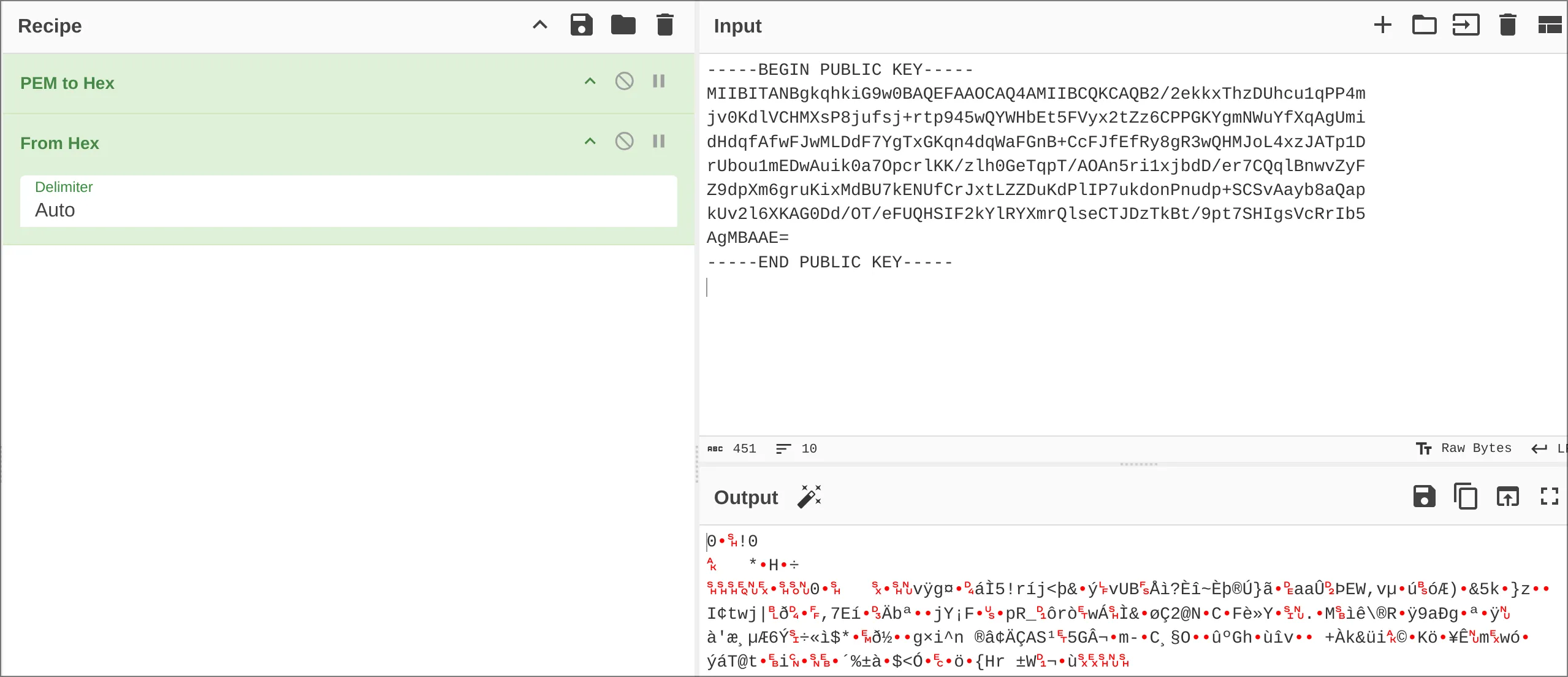
But actually, I realised something while reading the documents on the RSA module: I can simply import the public key:
from Crypto.PublicKey import RSA
RSA.import_key(k)Output:
RsaKey(n=150220..., e=65537)That is the n and e. d is any number such that:
1 == (65537 * d) % tot(n)
where tot(p*q) = lcm(p-1, q-1)
--> Carmichael's totient functionsleep is goood
I went to sleep, and I woke up with a realisation. The Wikipedia article or RSA states that:
To make factoring harder, p and q should be chosen at random, be both large and have a large difference.
This setup does not use a large difference, but literally the next prime. This is bad because then the prime nubmers are basically very close to the square root of the product.
let q = p + x + y
n
= t^2
= (p)(p+x+y)
= p^2 + px + py
= (t-x)(t+y)
= t^2 - xt + yt - xy
yt - xt - xy = 0
yt - xt = xy
t(y-x) = xy
t = xy/(y-x)Anyways I don’t think this is gonna be fun trying out. I will just brute force. I can round down the square root of n to get t-a, then find the next prime such that (t-a)+c = q. Then I will check if (n%q)==0, else continue to the next prime. Eventually (n%q)==0 is true and p=n/q or p=n/(t-a)+c.
from Crypto.PublicKey import RSA
from Crypto.Util.number import isPrime
from math import isqrt, lcm
def getNextPrime(num):
is_prime = False
while not is_prime:
num += 1
is_prime = isPrime(num)
return num
with open("key") as f:
k = f.read()
pub_key = RSA.import_key(k)
n = pub_key.n
e = pub_key.e
p = isqrt(n)
q = 0
while p < n:
p = getNextPrime(p)
if n % p == 0:
q = n // p
break
assert q > 0
assert p*q==n
# 1 = e*d mod tot(n)
d = pow(e, -1, lcm(p-1, q-1))
private_key = RSA.construct((n, e, d))
c = 5 # Long cipher
dsmg = private_key.decrypt(c)
print(dmsg)╰─❯ bpython script.py
Traceback (most recent call last):
File "script.py", line 38, in <module>
dsmg = private_key.decrypt(c)
^^^^^^^^^^^^^^^^^^^^^^
File "/nix/store/j64ali6q5875a6byqhhba5xjphw8kmz5-python3-3.12.8-env/lib/
python3.12/site-packages/Crypto/PublicKey/RSA.py", line 442, in decrypt
raise NotImplementedError("Use module Crypto.Cipher.PKCS1_OAEP instead")
NotImplementedError: Use module Crypto.Cipher.PKCS1_OAEP insteadOh. ok I will swap out the function, since I am using PyCryptoDome instead.
# dsmg = private_key.decrypt(c)
dmsg = PKCS1_OAEP.new(private_key).decrypt(c)╰─❯ bpython script.py
Traceback (most recent call last):
File "script.py", line 38, in <module>
dmsg = PKCS1_OAEP.new(private_key).decrypt(c)
^^^^^^^^^^^^^^^^^^^^^^^^^^^^^^^^^^^^^^
File "/nix/store/j64ali6q5875a6byqhhba5xjphw8kmz5-python3-3.12.8-env/lib/
python3.12/site-packages/Crypto/Cipher/PKCS1_OAEP.py", line 168, in decrypt
if len(ciphertext) != k or k < hLen+2:
^^^^^^^^^^^^^^^
TypeError: object of type 'int' has no len()Haiz. I took a look at the documentation again:
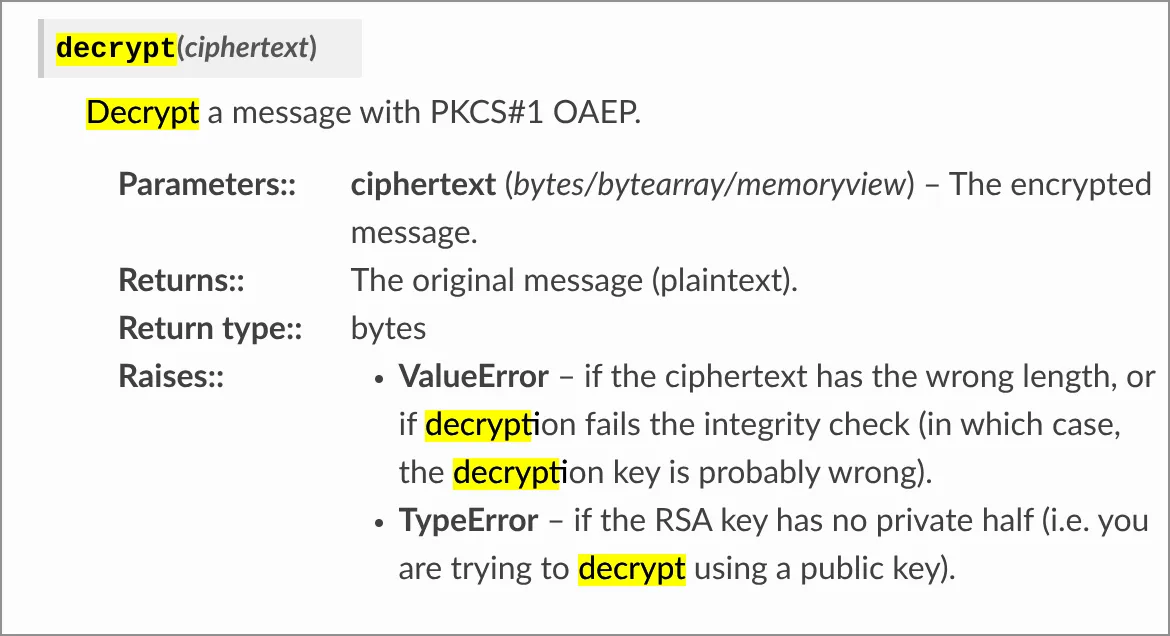
I need to convert the ciphertext into bytes
dmsg = PKCS1_OAEP.new(private_key).decrypt(bytes(c))
# ^^^^^^^^I try again
╰─❯ bpython script.py
Traceback (most recent call last):
File "script.py", line 38, in <module>
dmsg = PKCS1_OAEP.new(private_key).decrypt(bytes(c))
^^^^^^^^
OverflowError: cannot fit 'int' into an index-sized integerI look at how this file was created:
m = bytes_to_long(flag.encode())
c = pow(m, e, n)
with open("output", "w") as f:
f.write(f"c = {c}")I try doing this instead:
dmsg = pow(c, e, d)And I try again:
╰─❯ bpython script.py
12043454892708555159153881......Ok that is good. I just need to convert this into a string of text. I found a function in Crypto.Util.number called long2str, and also an appropriate long_to_bytes which I could have used to convert c into bytes but oh well.
print(long2str(dmsg))I try again
╰─❯ bpython script.py
/nix/store/j64ali6q5875a6byqhhba5xjphw8kmz5-python3-3.12.8-env/lib/python3.12/
site-packages/Crypto/Util/number.py:514: UserWarning: long2str() has been
replaced by long_to_bytes()
warnings.warn("long2str() has been replaced by long_to_bytes()")
b'\t\x8aN\x15o\xd89V.....oh.
dmsg = PKCS1_OAEP.new(private_key).decrypt(long_to_bytes(c))and…
╰─❯ bpython script.py
Traceback (most recent call last):
File "script.py", line 38, in <module>
dmsg = PKCS1_OAEP.new(private_key).decrypt(long_to_bytes(c))
^^^^^^^^^^^^^^^^^^^^^^^^^^^^^^^^^^^^^^^^^^^^^^^^^^^^^
File "/nix/store/j64ali6q5875a6byqhhba5xjphw8kmz5-python3-3.12.8-env/lib/
python3.12/site-packages/Crypto/Cipher/PKCS1_OAEP.py", line 191, in decrypt
raise ValueError("Incorrect decryption.")
ValueError: Incorrect decryption.When in doubt, blame the library.
Let’s go back to manual calculation:
dmsg = pow(c, e, d)Wait. It is supposed to be c^d mod n!
m = pow(c, d, n)
print(long_to_bytes(m))Anddddddd
╰─❯ bpython script.py
b'CS2107{rsa_stands_for_really_secure_algorithm}':facepalm:
Key: CS2107{rsa_stands_for_really_secure_algorithm}
M.3 Encryption Service
Prompt:
Author: River Koh
I made a stream cipher that uses 2 keys, surely this should be twice as secure!
nc cs2107-ctfd-i.comp.nus.edu.sg 12345Attachments:
service.py
This is the service.py that runs on the server:
import socket
import os
import random
import string
import threading
SECRET_KEY = 'REDACTED'
FLAG = 'REDACTED'
def encrypt(message):
if len(message) <= 0 or len(message) > 40:
return ''
result = []
prev = 0
for i in range(len(message)):
c = (ord(message[i]) + prev - ord(FLAG[i % len(FLAG)]))
c *= ord(SECRET_KEY[i % len(SECRET_KEY)])
c %= 1114111 # limit range of characters to chr()
result.append(c)
prev = c
print(result)
return ''.join(map(chr, result))
def handle_client(client_socket):
while True:
# Send a welcome message and request for encryption or decryption
client_socket.send(b"Welcome to the Encryption Service!\n")
while True:
client_socket.send(b"Enter the message you would like to encrypt:\n")
message = client_socket.recv(128).decode('utf-8').strip()
encrypted_message = encrypt(message)
client_socket.send(f"Encrypted Message: {encrypted_message}\n"
.encode('utf-8'))
client_socket.close()
HOST = '0.0.0.0'
PORT = 8080
server_socket = socket.socket(socket.AF_INET, socket.SOCK_STREAM)
server_socket.bind((HOST, PORT))
server_socket.listen(1)
print(f"Server listening on {HOST}:{PORT}...")
while True:
client_socket, client_address = server_socket.accept()
print(f"Connection from {client_address}")
client_thread = threading.Thread(target=handle_client, args=(client_socket,))
client_thread.daemon = True # Make the thread a daemon thread so it closes
# when the main program exits
client_thread.start()When manually accessing the service (via pe111.comp.nus.edu.sg), I was able to enter text but the reply was Mojibake, often with arabic text. Entering more than 40 characters yields an empty string.
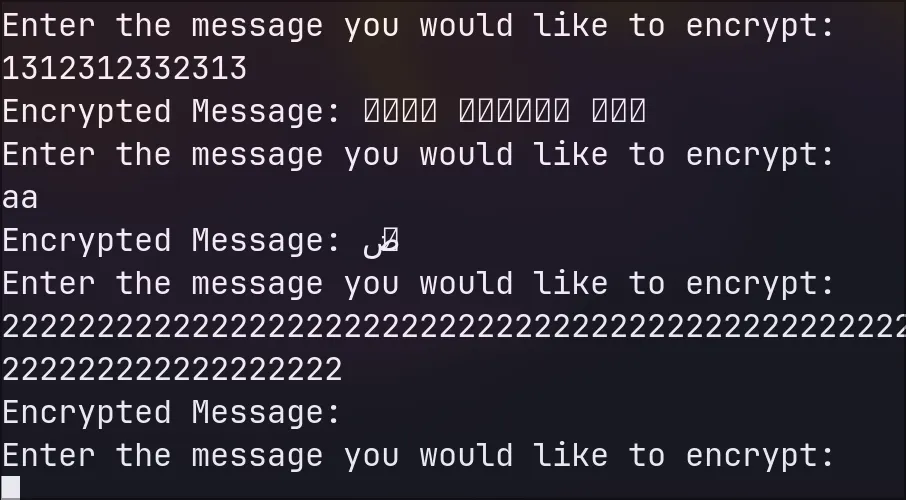
I will use the gift of pwntools to help me.
I first make sure that I am able to interface with the server:
from pwn import ssh
import os
from dotenv import load_dotenv
load_dotenv("../.env")
server="cs2107-ctfd-i.comp.nus.edu.sg"
port=12345
shell = ssh(user=os.getenv("USERNAME"), password=os.getenv("PASSWORD"),
host=os.getenv("JUMP_SERVER"))
conn = shell.connect_remote(host=server, port=port)
# start
print(conn.recvlines(timeout=5))
# cleanup
conn.close()
shell.close()Result - I get the Welcome to the Encryption Service message!
╰─❯ bpython script.py
[x] Connecting to pe111.comp.nus.edu.sg on port 22
[+] Connecting to pe111.comp.nus.edu.sg on port 22: Done
[*] yukna@pe111.comp.nus.edu.sg:
Distro Ubuntu 20.04
OS: linux
Arch: amd64
Version: 5.4.0
ASLR: Enabled
SHSTK: Disabled
IBT: Disabled
[x] Connecting to cs2107-ctfd-i.comp.nus.edu.sg:12345 via SSH to pe111.comp.
nus.edu.sg
[+] Connecting to cs2107-ctfd-i.comp.nus.edu.sg:12345 via SSH to pe111.comp.
nus.edu.sg: Done
[b'Welcome to the Encryption Service!', b'Enter the message you would like
to encrypt:']
[*] Closed remote connection to cs2107-ctfd-i.comp.nus.edu.sg:12345 via SSH
connection to pe111.comp.nus.edu.sg
[*] Closed connection to 'pe111.comp.nus.edu.sg'I create a simple loop to test and try different inputs, and capture the outputs given by the server
responses = []
tests = [b"test", b"0"*39, b"1"*40,b"2"*41]
prompt = b"Enter the message you would like to encrypt:"
reply = b"Encrypted Message: "
for test_lines in tests:
conn.recvuntil(prompt)
conn.sendline(test_lines)
conn.recvuntil(reply)
responses.append(conn.recvline())
for i,line in enumerate(tests):
print(f"\n\n given:{line}, \n received:{responses[i]}")And as expected, 40 characters is the limit:
[x] Connecting to cs2107-ctfd-i.comp.nus.edu.sg:12345 via SSH to pe111.comp.
nus.edu.sg
[+] Connecting to cs2107-ctfd-i.comp.nus.edu.sg:12345 via SSH to pe111.comp.
nus.edu.sg: Done
given:b'test',
received:b'\xe0\xa8\xa5\xf1\x81\x87\xaa\xf2\xb0\xae\xa0\xf1\x8b\xb2\xb4\n'
given:b'000000000000000000000000000000000000000',
received:b'\xf4\x8f\xb0\....\n'
given:b'1111111111111111111111111111111111111111',
received:b'\xf4\x8f\xb1\x85\....\n'
given:b'22222222222222222222222222222222222222222',
received:b'\n'Now that that is working, I am particularly interested in:
def encrypt(message):
if len(message) <= 0 or len(message) > 40:
return ''
result = []
prev = 0
for i in range(len(message)):
c = (ord(message[i]) + prev - ord(FLAG[i % len(FLAG)]))
c *= ord(SECRET_KEY[i % len(SECRET_KEY)])
c %= 1114111 # limit range of characters to chr()
result.append(c)
prev = c
print(result)
return ''.join(map(chr, result))I noticed that:
- message length is 1-40 characters
- each character’s byte value is added to the previous cipher char, and subtracted from the byte value of the character of the flag at the index of the current message charater index
- this is then multiplied by the byte value of the ith character of secret key
For the very first character, prev is zero. So if m0 is the byte of the first character given, and m1 is the next byte, the encrypted ciphertext byte is:
f0 = ord(FLAG[0])
s0 = ord(SECRET_KEY[0])
c0 = (m0 - f0) * s0
f1 = ord(FLAG[1])
s1 = ord(SECRET_KEY[1])
c1 = (m1 + c0 - f1) * s1 if we can find an m0 such that c0 is zero, then
# (m0 - f0) * s0 == 0
# ==> (f0 - f0) * s0 == 0
# ==> m0 == f0
c0 = 0
c1 = (m1 - f1) * s1 Note how the m0 is equal to f0 because f and s are assumed to be nonzero.
guesses = b""
for i in range(40):
for x in range(255):
guess = guesses + x.to_bytes()
conn.recvuntil(prompt)
conn.sendline(guess)
conn.recvuntil(reply)
y = conn.recvline().strip()
print(f"[{x}] guess: {guess}, response: {y.decode()}")
if y == 0:
guesses += bytes(x)
break
print(guesses)What I get:
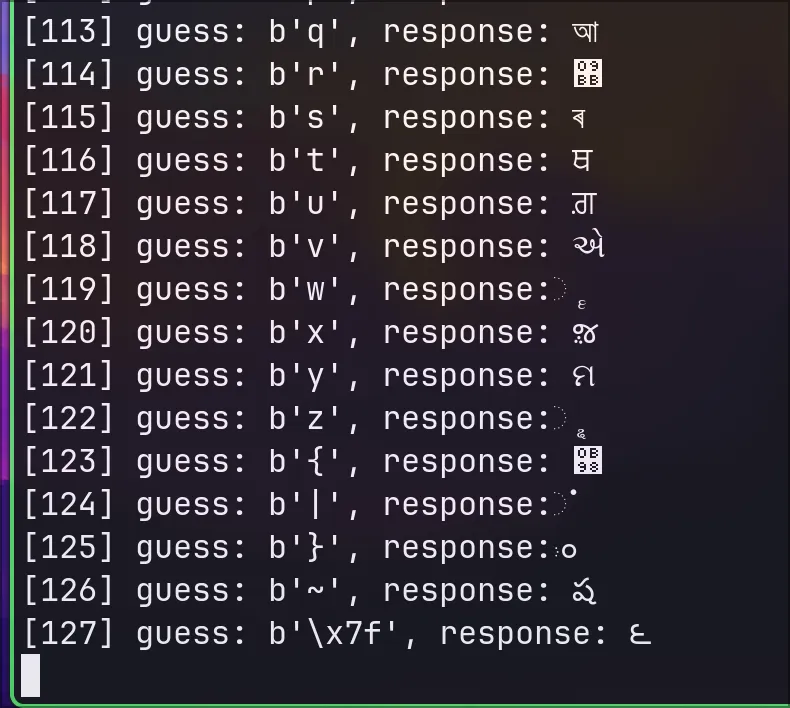
The console freezes after 127th character.
This is when I realised my mistake. The bytes() function is overloaded and can either take in an array or an integer with different outcomes:
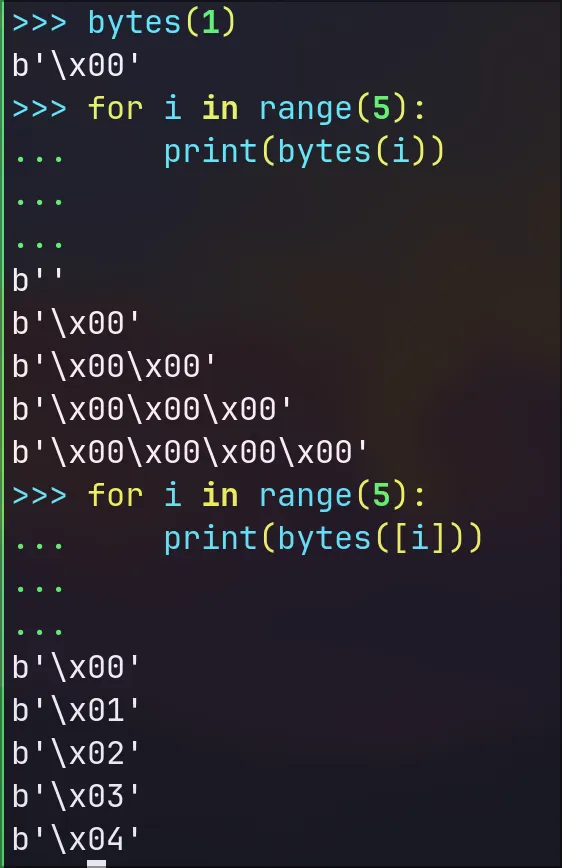
I fixed the loop:
guesses = b""
for i in range(40):
for x in range(256):
guess = guesses + (bytes([x]))
conn.recvuntil(prompt)
conn.sendline(guess)
conn.recvuntil(reply)
y = int.from_bytes(conn.recvline().strip())
if y == 0:
print(f"[{i}][{x}] guess: {guess}, response: {y}")
guesses = guesses + (bytes([x]))
break
print(guesses)And reran the script.
[0][9] guess: b'\t', response: 0
[1][9] guess: b'\t\t', response: 0
[2][9] guess: b'\t\t\t', response: 0
[3][9] guess: b'\t\t\t\t', response: 0
[4][9] guess: b'\t\t\t\t\t', response: 0
[5][9] guess: b'\t\t\t\t\t\t', response: 0Now, something is wrong because this is definitely not right. I assume it is because of this line in the server:
message = client_socket.recv(128).decode('utf-8').strip()The strip takes out the whitespace character (ie \t) and a blank message will return a blank cipher, so that’s not right. This also means my check for null characters is not technically right since a string of byte objects of \x00 is not the integer 0. Changes:
# strip will not remove null bytes but will remove whitespaces:
# >>> bytes([0]).decode().strip()
# '\x00'
# >>> bytes([ord('\t')]).decode().strip()
# ''
test_byte = (bytes([x]))
if len(test_byte.decode().strip()) == 0:
continue
guess = guesses + test_byte
# .....
# change the check to test all bytes and use all() to fold results
y = conn.recvline().strip()
if all(b == 0 for b in y):And this was glorious, watching the characters come out one by one:
[x] Connecting to cs2107-ctfd-i.comp.nus.edu.sg:12345 via SSH to pe111.comp.
nus.edu.sg
[+] Connecting to cs2107-ctfd-i.comp.nus.edu.sg:12345 via SSH to pe111.comp.
nus.edu.sg: Done
[0][67] guess: b'C', response: b'\x00'
[1][83] guess: b'CS', response: b'\x00\x00'
[2][50] guess: b'CS2', response: b'\x00\x00\x00'
[3][49] guess: b'CS21', response: b'\x00\x00\x00\x00'
[4][48] guess: b'CS210', response: b'\x00\x00\x00\x00\x00'
[5][55] guess: b'CS2107', response: b'\x00\x00\x00\x00\x00\x00'
[6][123] guess: b'CS2107{', response: b'\x00\x00\x00\x00\x00\x00\x00'
[7][119] guess: b'CS2107{w', response: b'\x00\x00\x00\x00\x00\x00\x00\x00'
[8][48] guess: b'CS2107{w0', response: b'\x00\x00\x00\x00\x00\x00\x00\x00\x00'
....Key: CS2107{w0w_y0u_c4n_mult1ply_by_0}
Hard
H.1 Mersenne Untwister
Prompt:
Author: Lee Kai Xuan
It's just 8 random bytes that you have to guess. Time to test your luck!
nc cs2107-ctfd-i.comp.nus.edu.sg 8001
Unlock Hint for 0 points
Is there any issue with reusing the same PRNG an unlimited number of times?
I heard there's a Python package that can help you with this...something
about "rand" and "crack"...
Unlock Hint for 0 points
How does Python implement random.randbytes? How does it relate to
random.getrandbits? Look at the Python source code!Attachments:
server.py
First, let’s see the server.py contents:
import random
FLAG = "REDACTED"
print("Hey, see if you can get the next hexadecimal value!")
while True:
# Original challenge was simply random.randbytes(4)
# which meant you just needed to iterate through 624 times
# instead of 312 times but splitting the hex into 2 to submit
correct = random.randbytes(8).hex()
guess = input("Your guess: ")
if guess == correct:
print(f"Wow, you must be so lucky! Here's your flag: {FLAG}")
break
else:
print(f"Unlucky, the correct number was {correct}. Try again!")Looks like a task to exploit the pseudorandom generator’s pseudo randomness.
I first whip up a scripy.py:
from pwn import ssh
import os
from dotenv import load_dotenv
load_dotenv("../.env")
server="cs2107-ctfd-i.comp.nus.edu.sg"
port=8001
shell = ssh(user=os.getenv("USERNAME"), password=os.getenv("PASSWORD"),
host=os.getenv("JUMP_SERVER"))
conn = shell.connect_remote(host=server, port=port)
# start
prompt = b"Your guess: "
correct = b"Wow, you must be so lucky! Here's your flag: "
wrong = b"Unlucky, the correct number was "
conn.recvuntil(prompt)
conn.sendline(bytes([0,0,0,0,0,0,0,0]).hex())
result = conn.recvline()
print(result)
# cleanup
conn.close()
shell.close()b'Unlucky, the correct number was 794e47ec8e94cac5. Try again!\n'Ok it works. Now the trick is to continuously try until the response matches the correct string. It is not feasible to loop over 2^8^8 guesses, so let’s look at randbytes. The documents say:
random.randbytes(n) Generate n random bytes. This method should not be used for generating security tokens. Use secrets.token_bytes() instead.
In the source code random.py, this is how we get the random bytes:
def randbytes(self, n):
"""Generate n random bytes."""
return self.getrandbits(n * 8).to_bytes(n, 'little')
def getrandbits(self, k):
"""getrandbits(k) -> x. Generates an int with k random bits."""
if k < 0:
raise ValueError('number of bits must be non-negative')
numbytes = (k + 7) // 8 # bits / 8 and rounded up
x = int.from_bytes(_urandom(numbytes))
return x >> (numbytes * 8 - k) # trim excess bitsSo to put in context, this is what happens:
random.randbytes(8)
==> getrandbits(64).to_bytes(8, 'little')
==> int.from_bytes(_urandom(8)) I cannot deny, I was lost here until I saw the hint for using randcrack. Also the title of this challence is Mersenne Untwister, which is a nod to the Mersenne Twister pseudorandom generator. Providing 624 32-bit numbers (4 bytes) would tweak the matrix enough to produce the same output as the pseudorandom generator used by urandom
I had to install randcrack from the repo as it is not packaged in the nixpkgs repositoy
(
buildPythonPackage rec {
pname = "randcrack";
version = "0.2.0";
src = fetchPypi {
inherit pname version;
sha256 = "sha256-zM9OzeoUdmZTDwgm0Rpyv8lnzNerNuLt+alR3nwHAhs=";
};
doCheck = false;
}
)I set up randcrack:
from randcrack import RandCrack
rc = RandCrack()
# ...
for i in range(624 // 2):
# ...
rc.submit(int(last_correct[:8], 16))
rc.submit(int(last_correct[8:], 16))
# ...
guess = rc.predict_getrandbits(64).to_bytes(8, 'little')
conn.recvuntil(prompt)
conn.sendline(bytes([0,0,0,0,0,0,0,0]).hex())
result = conn.recvline()
if result.decode().startswith(correct):
print(result)
else:
last_correct = result[len(wrong):len(wrong)+(8*2)]
print(f"It was {last_correct} not {guess}")Anyways it did not work. I am sad. I try a few things. One is to just submit the number as a single 64-bit integer and not 2 32-bit integers.
# rc.submit(int(last_correct[:8], 16))
# rc.submit(int(last_correct[8:], 16))
rc.submit(int(last_correct, 16))I also try changing the endianness:
guess = rc.predict_getrandbits(64).to_bytes(8, 'big').hex()Unfortunately I got:
ValueError: Didn't recieve enough bits to predictSo I have to manually split and feed the 32 bit numbers. I think maybe there might be an endianness issue.
I had to go toilet, and while on the thinking throne I did some test:

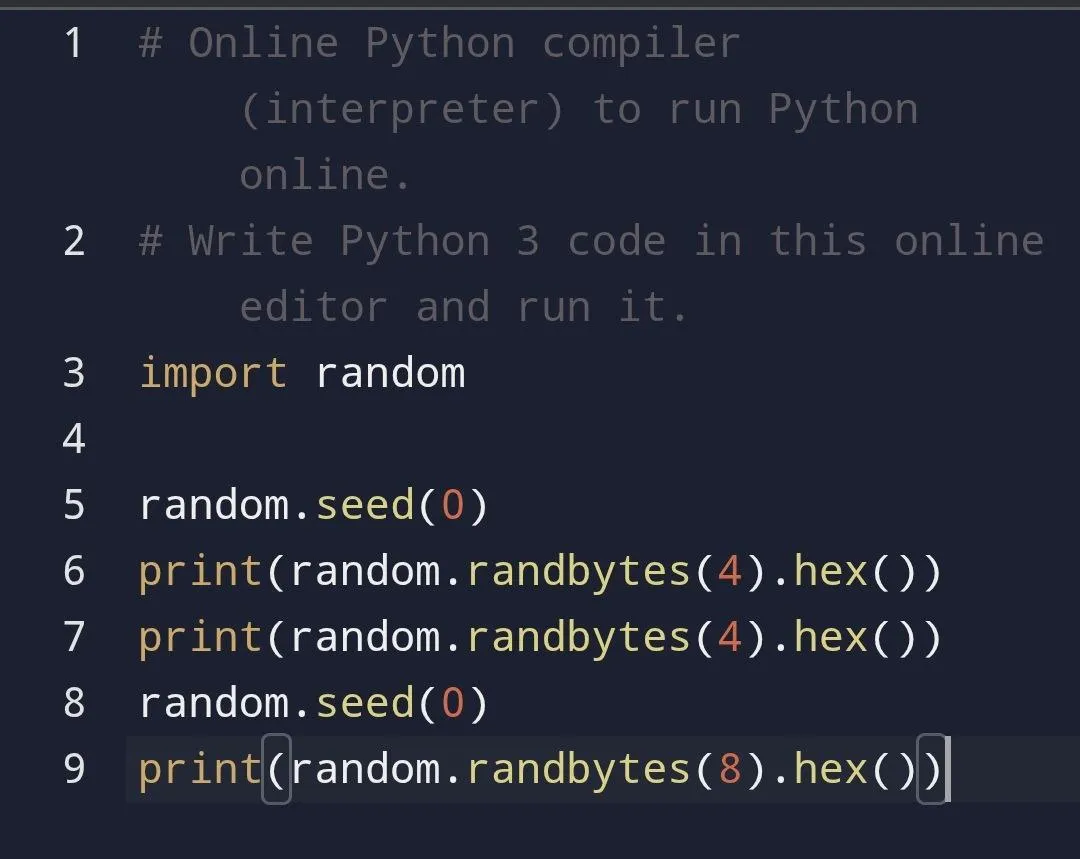
So this should be the correct order since the first 4 bytes comes first, in order, followed by the next 4 bytes
# received bytes are of:
# --> random.randbytes(8).hex()
# --> random.getrandbits(64).to_bytes(8, 'little').hex()
rc.submit(int(last_correct[:8], 16))
rc.submit(int(last_correct[8:], 16))Still not working. I decided to do a sanity check to see if I am using randcrack correctly:
import random
from randcrack import RandCrack
random.seed(0)
rc = RandCrack()
for i in range(624):
# n = random.randbytes(4).hex()
n = random.getrandbits(32)
rc.submit(n)
print(f"Random result: {random.getrandbits(32)}\nCracker result:
{rc.predict_getrandbits(32)}")
"""
╰─❯ bpython test.py
Random result: 2229104038
Cracker result: 2229104038
"""
random.seed(0)
rc = RandCrack()
for i in range(624):
n = random.randbytes(4).hex()
rc.submit(int(n, 16))
print(f"Random result: {random.getrandbits(32)}\nCracker result:
{rc.predict_getrandbits(32)}")
"""
╰─❯ bpython test.py
Random result: 2229104038
Cracker result: 2437392779
"""Ah, there seems to be an issue with converting the hex strings back into string. I am guessing it has to do with either endianness or signs. After some tinkering, I got it:
for i in range(624):
n = random.randbytes(4)
bs = [b for b in n]
bs.reverse()
rc.submit(int(bytes(bs).hex(),16))
print(f"Random result: {random.getrandbits(32)}\nCracker result:
{rc.predict_getrandbits(32)}")
"""
╰─❯ bpython test.py
Random result: 2229104038
Cracker result: 2229104038
"""It was the endianness! I now need to reverse the inputs I get from the server, and then feed it into randcrack but byte by byte…
random.seed(0)
rc = RandCrack()
for i in range(624):
n = random.randbytes(4).hex()
bytes_of_number = [n[i:2+i] for i in range(0, 8, 2)]
bytes_of_number.reverse()
rc.submit(int(''.join(bytes_of_number), 16))
print(f"Random result: {random.getrandbits(32)}\nCracker result:
{rc.predict_getrandbits(32)}")
"""
╰─❯ bpython test.py
Random result: 2229104038
Cracker result: 2229104038
"""
random.seed(0)
rc = RandCrack()
for i in range(312):
n = random.randbytes(8).hex()
bytes_of_number = [n[i:2+i] for i in range(0, 16, 2)]
bytes_of_number.reverse()
rc.submit(int(''.join(bytes_of_number[4:]), 16))
rc.submit(int(''.join(bytes_of_number[:4]), 16))
print(f"Random result: {random.getrandbits(32)}\nCracker result:
{rc.predict_getrandbits(32)}")
"""
╰─❯ bpython test.py
Random result: 2229104038
Cracker result: 2229104038
"""Perfect! I now need to bring this carefully into the actual script…
n = result[len(wrong):len(wrong)+(8*2)].decode()
bytes_of_number = [n[i:2+i] for i in range(0, 16, 2)]
bytes_of_number.reverse()
rc.submit(int(''.join(bytes_of_number[4:]), 16))
rc.submit(int(''.join(bytes_of_number[:4]), 16))Output:
[x] Connecting to cs2107-ctfd-i.comp.nus.edu.sg:8001 via SSH to pe111.comp.
nus.edu.sg
[+] Connecting to cs2107-ctfd-i.comp.nus.edu.sg:8001 via SSH to pe111.comp.
nus.edu.sg: Done
script.py:37: BytesWarning: Text is not bytes; assuming ASCII, no guarantees.
See https://docs.pwntools.com/#bytes
conn.sendline(guess)
b"Wow, you must be so lucky! Here's your flag: CS2107{untwist_me!}\n"
[*] Closed remote connection to cs2107-ctfd-i.comp.nus.edu.sg:8001 via SSH
connection to pe111.comp.nus.edu.sg
[*] Closed connection to 'pe111.comp.nus.edu.sg'Key: CS2107{untwist_me!}
H.2 Not So Random
Prompt:
Author: Cao Yitian
I was told that rand() is not secure, so I have decided to use time as a seed!
If I seeded my rand() and generated my AES key during runtime, surely I can
eliminate the security issue with rand()...
nc cs2107-ctfd-i.comp.nus.edu.sg 13337
Unlock Hint for 0 points
rand() is not secure, are you able to perfectly emulate the rand() call on the
server?
Unlock Hint for 0 points
If you are handling epoch conversion in your code, could there be some problems
with the timezone?Attachments:
flag.txtchall.caes.haes.c
This is very interesting. I will just paste the code for chall.c:
#include <stdio.h>
#include <stdlib.h>
#include <unistd.h>
#include <time.h>
#include <math.h>
#include <string.h>
#include "aes.h"
void setup() {
setbuf(stdin, 0);
setbuf(stdout, 0);
}
int main() {
setup();
// Display time to user
time_t raw;
time(&raw);
printf("Server connected.\n");
printf("%s\n", asctime(localtime(&raw)));
// Set seed as time
srand(time(NULL));
// Generate AES-128 key
unsigned char buf[16];
int i;
for (i = 0; i < sizeof(buf); i++) {
buf[i] = rand() % 256;
}
// Read flag from file
FILE *f = fopen("flag.txt", "r");
if (NULL == f) {
printf("File can't be opened \n");
return EXIT_FAILURE;
}
char ch;
char flag[32];
int idx = 0;
while ((ch = fgetc(f)) != EOF) {
sprintf(flag+idx, "%c", ch);
idx++;
}
// Encrypt flag
struct AES_ctx* ctx = malloc(sizeof(struct AES_ctx));
AES_init_ctx(ctx, buf);
char flag_encrypted[32];
strcpy(flag_encrypted, flag);
AES_ECB_encrypt(ctx, flag_encrypted);
// Print encrypted flag
char input[33];
printf("Ha! You will never guess the flag!\n");
printf("rand() might not be cryptographically secure, but surely it's \
secure enough if I use time as a seed!\n");
printf("You're free to try anyway, though.\n");
printf("Here's the encrypted flag in hexadecimal: ");
for (int i = 0; i < 32; i++) {
printf("%02X", (unsigned char)flag_encrypted[i]);
}
printf("\n");
printf("You can tell me your guess, and I'll let you know if it's correct:\
\n");
read(STDIN_FILENO, input, 33);
fflush(stdin);
// Check user input against actual flag
if (!strncmp(input, flag, 32)) {
printf("No way, how did you get my flag!?\n");
printf("I guess rand() wasn't secure afterall...\n");
} else {
printf("Wrong!!\n");
}
}Quick things I notice:
- flag is 32 charaters long
- We are being told the server time, but it is first converted to localtime and then formatted
- this time function is being used to set the seed for AES key generation
I quickly copy the script I had for the other challenges and made a quick basic script:
from pwn import ssh
import os
from dotenv import load_dotenv
load_dotenv("../.env")
server="cs2107-ctfd-i.comp.nus.edu.sg"
port=13337
shell = ssh(user=os.getenv("USERNAME"), password=os.getenv("PASSWORD"),
host=os.getenv("JUMP_SERVER"))
conn = shell.connect_remote(host=server, port=port)
# start
cipher_prompt = b"Here's the encrypted flag in hexadecimal: "
prompt = b"You can tell me your guess, and I'll let you know if it's correct:\n"
print(conn.recvuntil(cipher_prompt).decode())
cipher = conn.recvline()
conn.recvuntil(prompt)
conn.sendline(bytes(32)) # empty response
response = conn.recvline()
print(response.decode())
# cleanup
conn.close()
shell.close()This is the response:
[x] Connecting to cs2107-ctfd-i.comp.nus.edu.sg:13337 via SSH to pe111.comp.
nus.edu.sg
[+] Connecting to cs2107-ctfd-i.comp.nus.edu.sg:13337 via SSH to pe111.comp.
nus.edu.sg: Done
Server connected.
Sat Feb 15 20:00:20 2025
Ha! You will never guess the flag!
rand() might not be cryptographically secure, but surely it's secure enough
if I use time as a seed!
You're free to try anyway, though.
Here's the encrypted flag in hexadecimal:
Wrong!!
[*] Closed remote connection to cs2107-ctfd-i.comp.nus.edu.sg:13337 via SSH
connection to pe111.comp.nus.edu.sg
[*] Closed connection to 'pe111.comp.nus.edu.sg'for context, my local machine time is: Sat Feb 16 04:00:20 2025.
do not judge my working hours.
If I can get the key generated by rand(), which might be possible by grabbing the seed used (in this case the time) then I can generate the key by myself dynamically.
I just decided to build this server on my local machine, and:
╰─❯ gcc chall.c aes.c aes.h -o chall
chall.c: In function ‘main’:
chall.c:64:5: warning: ignoring return value of ‘read’ declared with attribute
‘warn_unused_result’ [-Wunused-result]
64 | read(STDIN_FILENO, input, 33);
| ^~~~~~~~~~~~~~~~~~~~~~~~~~~~~
╰─❯ ./chall
Server connected.
Mon Feb 17 16:13:59 2025
*** buffer overflow detected ***: terminated
fish: Job 2, './chall' terminated by signal SIGABRT (Abort)Oops. ok I will just try step by step. Anyways there are a few things to learn about time in C.
- the
time()function returns atime_ttype which is a unix timestamp integer. - the
gmtime()andlocaltime()functions converttime_ttostruct tmwhich containts the timestamp broken into human readable components, converted to UTC or local time respectively. - To reverse this,
mktime()convertsstruct tmback totime_t. - the
asctime()function convertsstruct tminto a readablestringof the formatWww Mmm dd hh:mm:ss yyyy.
This should show the time_t and string formats:
int main() {
time_t raw;
time(&raw);
printf("string local: %s\n", asctime(localtime(&raw)));
printf("string UTC: %s\n", asctime(gmtime(&raw)));
printf("raw time_t: %ld\n", raw);
return 0;
}Output:
╰─❯ gcc test.c -o test
╰─❯ chmod +x test
╰─❯ ./test
string local: Mon Feb 17 16:45:37 2025
string UTC: Mon Feb 17 08:45:37 2025
raw time_t: 1739781937This is how the string is formatted from tm:
str: Mon Feb 17 08:45:37 2025
int: 1 2 17 08 45 37 123
| | | | | | |
tm_sec --|--|---|--|--|--+ |
tm_min --|--|---|--|--+ |
tm_hour--|--|---|--+ |
tm_mday--|--|---+ |
tm_mon --|--+ |
tm_year--|-------------------+
tm_wday--+
tm_yday
tm_isdstIf we run this python script, we can get the correct epoch time:
date_time = datetime.datetime(2025, 2, 17, 8, 45, 37)
print("unix_timestamp => ", (time.mktime(date_time.timetuple())))
"""
output:
unix_timestamp => 1739781937.0
"""From the test done earlier when connecting to the server, the server’s local time seems to be UTC time, so we can directly convert the string to unix timestamp. I decided to use python’s datetime.strptime to get the timestamp:
conn.recvuntil(time_prompt)
time_str = conn.recvline().decode().strip()
utc_time = datetime.strptime(time_str, "%a %b %d %H:%M:%S %Y")
timestamp = datetime.timestamp(utc_time)This can then be fed back into the test c file which initialises the aes implementation and seeds the srand with the retrieved timestamp:
// seed rnd
long timestamp = strtol(argv[1], NULL, 10);
srand(timestamp);
// Generate AES-128 key
unsigned char buf[16];
int i;
for (i = 0; i < sizeof(buf); i++) {
buf[i] = rand() % 256;
}
struct AES_ctx* ctx = malloc(sizeof(struct AES_ctx));
AES_init_ctx(ctx, buf);
// convert hex string to char array
unsigned char flag_encrypted[32];
unsigned char *dst = flag_encrypted;
unsigned char *end = flag_encrypted + sizeof(flag_encrypted);
char *src = argv[2];
unsigned int u;
while (dst < end && sscanf(src, "%2x", &u) == 1)
{
*dst++ = u;
src += 2;
}
AES_ECB_decrypt(ctx, flag_encrypted);
printf("%s", flag_encrypted);My only concern is that the time outputted by the server and the seed used by the server differs by a few milliseconds, but it should not be an issue since unix integer timestamps have one second resolution so as long as the consecutive operations occur within the same second, the value returned by time() should be the same.
JzZ,snd0m_4ft3r_4ll?}This is what I get as the output. Strange. If I let my python script collect the result via subprocess.check_output, I get this string of bytes:
b'2\xf0]\x98~\xef\xc6\x0f\xdf?w\x85\x85\x9a\xb4\x11nd0m_4ft3r_4ll?}\n'The good thing is that it is consistant. This suggests that the time that I grab and the actual time used is off. This could be due to the server actually not running on the correctly synchronised time - so its local time is not GMT+00 but some other time zone, offsetting the actual wrong system time.
What time zone? I do not know. I think at this point, I am gonna try brute force different offsets:
conn.recvuntil(time_prompt)
time_str = conn.recvline().decode().strip()
utc_time = datetime.strptime(time_str, "%a %b %d %H:%M:%S %Y")
+ timedelta(hours=offset)
timestamp = int(datetime.timestamp(utc_time))results:
[x] Connecting to pe111.comp.nus.edu.sg on port 22
[+] Connecting to pe111.comp.nus.edu.sg on port 22: Done
[*] yukna@pe111.comp.nus.edu.sg:
Distro Ubuntu 20.04
OS: linux
Arch: amd64
Version: 5.4.0
ASLR: [32mEnabled[m
SHSTK: [31mDisabled[m
IBT: [31mDisabled[m
[x] Connecting to cs2107-ctfd-i.comp.nus.edu.sg:13337 via SSH to pe111.comp.
nus.edu.sg
[+] Connecting to cs2107-ctfd-i.comp.nus.edu.sg:13337 via SSH to pe111.comp.
nus.edu.sg: Done
========================
received Mon Feb 17 11:19:08 2025, trying offset of -24: 2025-02-16 11:19:08
b'1\xa5\x11\xc9\nJ"Y;\x87\xe3\xe8\xb1\x94\xd5\xe9nd0m_4ft3r_4ll?}\n'
Wrong!!
[*] Closed remote connection to cs2107-ctfd-i.comp.nus.edu.sg:13337 via SSH
connection to pe111.comp.nus.edu.sg
[x] Connecting to cs2107-ctfd-i.comp.nus.edu.sg:13337 via SSH to pe111.comp.
nus.edu.sg
[+] Connecting to cs2107-ctfd-i.comp.nus.edu.sg:13337 via SSH to pe111.comp.
nus.edu.sg: Done
========================
...
========================
received Mon Feb 17 11:19:08 2025, trying offset of 7: 2025-02-17 18:19:08
b'\x95\xe8x#Z\xa0\xa1i\xf8\x97\xd0H\t8\x19\xd4nd0m_4ft3r_4ll?}\n'
Wrong!!
[*] Closed remote connection to cs2107-ctfd-i.comp.nus.edu.sg:13337 via SSH
connection to pe111.comp.nus.edu.sg
[x] Connecting to cs2107-ctfd-i.comp.nus.edu.sg:13337 via SSH to pe111.comp.
nus.edu.sg
[+] Connecting to cs2107-ctfd-i.comp.nus.edu.sg:13337 via SSH to pe111.comp.
nus.edu.sg: Done
========================
received Mon Feb 17 11:19:08 2025, trying offset of 8: 2025-02-17 19:19:08
CS2107{n0t_s0_r4nd0m_4ft3r_4ll?}
No way, how did you get my flag!?
[*] Closed remote connection to cs2107-ctfd-i.comp.nus.edu.sg:13337 via SSH
connection to pe111.comp.nus.edu.sg
[x] Connecting to cs2107-ctfd-i.comp.nus.edu.sg:13337 via SSH to pe111.comp.
nus.edu.sg
[+] Connecting to cs2107-ctfd-i.comp.nus.edu.sg:13337 via SSH to pe111.comp.
nus.edu.sg: Done
========================
received Mon Feb 17 11:19:08 2025, trying offset of 9: 2025-02-17 20:19:08
....wonderful. I should have guessed it was 8h difference. But we can’t always be sure.
Key: CS2107{n0t_s0_r4nd0m_4ft3r_4ll?}